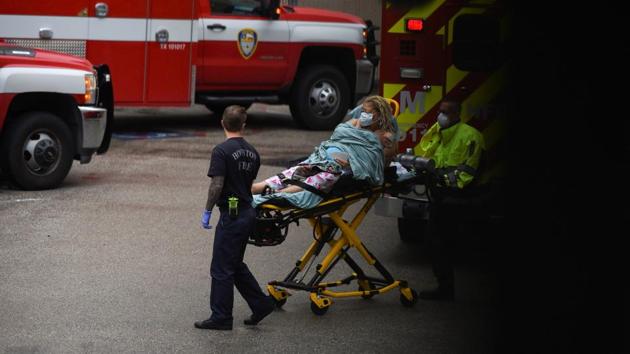Coronavirus pandemic: Critically ill Covid-19 patients 10 times more likely to develop heart rhythm disorders
COVID-19 patients who are admitted to an ICU may be ten times more likely than others hospitalised with the viral infection to suffer cardiac arrest, according to a new study which may help better protect those most vulnerable to the disease.
COVID-19 patients who are admitted to an intensive care unit (ICU) may be ten times more likely than others hospitalised with the viral infection to suffer cardiac arrest or heart rhythm disorders, according to a new study which may help better protect those most vulnerable to the disease. Researchers, including those from the University of Pennsylvania in the US, said cardiac arrests and heartbeat rhythm disturbances suffered by some patients with COVID-19 are likely triggered by a severe, systemic form of the disease, and are and not the sole consequence of the viral infection. The findings, published in the Heart Rhythm Journal, differ significantly from early reports which showed a high incidence of arrhythmias among all COVID-19 patients, according to the scientists.

They said the results provide more clarity about the role of the novel coronavirus, SARS-COV-2, and the disease it causes, COVID-19, in the development of arrhythmias, including irregular heart rate, slow heart rhythms, or rapid heart rate that stops by itself within 30 seconds.
“In order to best protect and treat patients who develop COVID-19, it’s critical for us to improve our understanding of how the disease affects various organs and pathways within our body -- including our heart rhythm abnormalities,” said study senior author Rajat Deo from the University of Pennsylvania. “Our findings suggest that non-cardiac causes such as systemic infection, inflammation, and illness are likely to contribute more to the occurrence of cardiac arrest and arrhythmias than damaged or infected heart cells due to the viral infection,” Deo said.
Earlier studies had suggested that COVID-19 is associated with a high incidence of cardiac arrhythmias, particularly among critically ill patients with early reports indicating that 44 per cent of patients admitted to the ICU suffered heartbeat rhythm disturbances. According to the researchers, heart rhythm problems occur when electrical impulses that coordinate heartbeats don’t work properly, causing the heart to beat too fast, too slow, or irregularly. If left untreated, they said cardiac arrhythmias can lead to serious medical conditions, including stroke and cardiac arrest -- the abrupt loss of heart function.
In the study, the scientists evaluated the risk and incidence of cardiac arrest and arrhythmias among 700 hospitalised patients with COVID-19. They assessed the clinical records for patient demographics, and medical comorbidities such as heart disease, diabetes and chronic kidney disease, and recorded patient vitals, test results, and treatment. According to the study, the patients had a mean age of 50 years. The researchers identified a total of 53 arrhythmic events -- nine patients who suffered cardiac arrest, 25 patients with atrial fibrillation who required treatment, nine patients with clinically significant slow heart rhythms, and 10 people who had rapid heart rate that stopped by itself within 30 seconds. Of the 700 patients hospitalised, they said about 11 per cent were admitted to the ICU. None of the other hospitalised patients suffered a cardiac arrest, the study noted. On controlling for underlying demographic and clinical factors, the scientists found that cardiac arrest and arrhythmias were more likely to occur among patients in an ICU compared to the other hospitalised patients.
Citing the limitations of the study, they said the analysis was conducted from a single centre serving a large urban population.
“More research is needed to assess whether the presence of cardiac arrhythmias have long-term health effects on patients who were hospitalised for COVID-19,” Deo said.
(This story has been published from a wire agency feed without modifications to the text. Only the headline has been changed.)
Catch your daily dose of Fashion, Health, Festivals, Travel, Relationship, Recipe and all the other Latest Lifestyle News on Hindustan Times Website and APPs.



